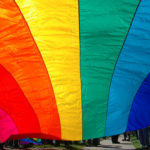Lawrence ranks as most LGBTQ-inclusive city in Kansas; city plans more improvements

photo by: Journal-World File Photo
A gay pride flag whips in the wind as marchers prepare for a march down Massachusetts Street in this file photo from April 23, 2005.
A new index ranks Lawrence as by far the most LGBTQ-inclusive city in the state, and city officials plan to build on that.
Lawrence received a score of 74 out of 100 in the Human Rights Campaign’s municipal equality index, which measures how inclusive municipal laws, policies and services are for LGBTQ people.
Municipal equality index of Kansas cities
Lawrence: 74
Manhattan: 57
Kansas City, Kan.: 35
Topeka: 35
Hutchinson: 32
Wichita: 31
Emporia: 23
Overland Park: 19
Olathe: 7
Source: Human Rights Campaign
Assistant City Manager Casey Toomay — who is also the city’s first liaison for LGBTQ issues — said the city is excited about the score and hopes to use the index to identify areas where the city is doing well and where it can improve.
“We are looking at this tool to help us recognize things we can do and processes or procedures we could put in place,” Toomay said.
The Human Rights Campaign ranked 506 U.S. cities as part of the annual index. Rankings across the country vary from single-digit scores to 100. Olathe, for instance, received a score of 7 and dozens of cities earned a score of 100. Those earning 100 include Columbia, Mo., Austin, Texas, and New York.
The index is calculated annually and includes five categories: nondiscrimination laws; the municipality as an employer; municipal services; law enforcement; and LGBTQ community relationship. Cities can also receive bonus points in some categories, for things such as having openly LGBTQ elected or appointed leaders.
While Lawrence scored high for having nondiscrimination ordinances in place, its overall score was brought down by low scores in other categories.
Lawrence received a perfect score in the nondiscrimination laws category, which evaluates whether discrimination on the basis of sexual orientation and gender identity is prohibited. The city was evaluated on its nondiscrimination laws for employment, housing and public accommodations and received all points possible for a total of 30 points.
Another plus for the city, under the municipal services category, is the city’s use of a human rights commission. The city’s nine-member Human Relations Commission has the ability to investigate, rule upon and resolve discrimination complaints, and has filed discrimination lawsuits on behalf of Lawrence residents.
Lawrence lost the most points — 22 in total — in the municipality as an employer and law enforcement categories. Specifically, the city lost points for not having an LGBTQ police liaison or task force, transgender-inclusive health care benefits, and a nondiscrimination ordinance for city contractors. The city also scored low in the LGBTQ community relationship category, which measures city leadership’s “commitment to fully include the LGBTQ community and advocate for full equality.”
Toomay said the city would be looking to see if changes can be made at the city staff level or by the City Commission to improve the city’s score. At this point, she said she doesn’t have specifics about what those changes might be.
“I think we’re still in the diagnosis sort of phase,” Toomay said. “Having just received this score, we’ll now be able to really look at it. As we continue to have our strategic planning conversations, as we continue to talk about budget, we’ll be able to use this like many other tools.”
The city’s score for this year is also a 13-point improvement over last year’s. Some of those improvements were due to providing more information to the Human Rights Campaign, according to city management intern Danielle Buschkoetter. For instance, Buschkoetter said this year’s score in the municipal services category better reflected city funding to outside agencies that provide services to LGBTQ people.
Another change that gained the city points is the appointment of Toomay as the city’s liaison to the LGBTQ community, which is now part of Toomay’s official job responsibilities. Toomay said the main thing the liaison role provides is a point of contact, but that other aspects could be added in future.







